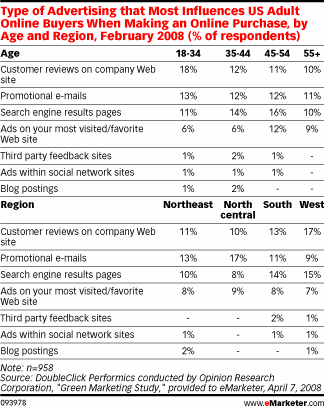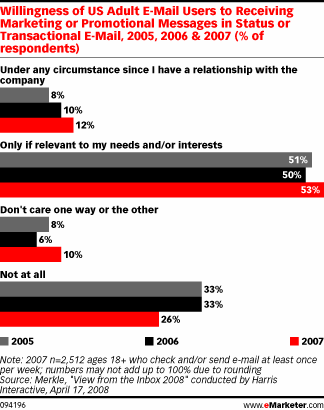Sei que estou em dívida com todos vocês sobre a minha apresentação de TCC sobre e-mail marketing e também com um post mais completo no blog. Tanto por que fiz a pesquisa, a apresentação e depois de tanta informação sobre o assunto meio que torrei a paciência em escrever ou falar sobre isso.
Não foi só pela quantidade de informação, mas devido a tantos outros motivos que não vêm ao caso e ao fato de não ter concluído um artigo sobre o assunto, enfim, ainda tenho esperança em fazê-lo antes de ir atrás da minha pós, que por sinal, não tenho idéia do que será, mas enfim... Quem começa não pára, em breve voltaremos à louca vida.
Mas o assunto do post não é esse. Em 21 de abril, o e-Marketer, um site dedicado a pesquisas com foco online, publicou um artigo sobre o assunto, com o título “E-Mail Marketing Still Works” qual transcrevo aqui devido ao laço com o assunto.
Lembrando que a pesquisa é internacional e foca muito nos Americanos, enfim, é bom dizer que o perfil do consumidor online acaba sendo parecido, mas não muito, portanto, tome como base a informação, não como regra, ok?
E-Mail Marketing Still Works
APRIL 21, 2008But consumer standards of relevance are high.
First, the good news: permission-based e-mail is great at getting consumers to buy.
Half of US adult e-mail users surveyed in April 2008 for Merkle's "View from the Inbox" study, conducted with Harris Interactive, said they had made an online purchase in the previous year as a result of permission-based marketing.
In addition, e-mail was second only to customer reviews on Web sites for influencing online purchases, according to DoubleClick Performics' "Green Marketing Study," conducted by Opinion Research Corporation in February 2008. E-mail was roughly equal to search results in terms of influencing online purchases.

Bad news for e-mail marketers included the fact that consumers are increasingly willing to revoke permission that they have previously granted and that the bar for relevance remains high.
About one-third of respondents in the Merkle study also said they had stopped doing business with at least one company as a result of poor e-mail marketing practices.
In the same vein, more than half of US adult e-mail users told Merkle in 2007 that they were only willing to get marketing or promotional messages in status or transactional e-mails if the offers were relevant to them.
"There is a substantial gap between what marketers believe is relevant to the consumer, and what consumers rate as valuable," said Lori Connolly, director of research at Merkle.
"Traditionally, marketers believed that relevancy meant pushing content that is based on stated preferences or behavior, but companies need to update their view of what is relevant," Ms. Connolly said.

Consumer wariness is often justified. Some marketers are the victims of spammers, who ruin it for everyone, according to David Hallerman, senior analyst at eMarketer.
"Consumers welcome relevant, opt-in e-mails from companies they have a relationship with," said Mr. Hallerman. "But the broad spectrum of spam—any unsolicited message—continues to degrade the e-mail environment for all parties."
Bem, espero que tenham gostado e aproveitem a informação.






Nenhum comentário:
Postar um comentário